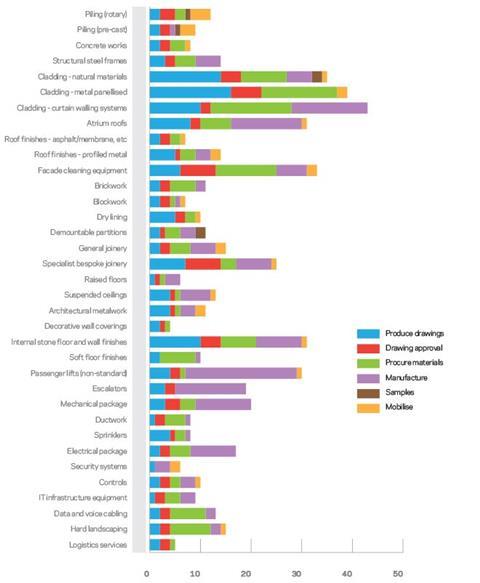With six packages increasing their lead times and widespread reports of increasing enquiries and workload, growth is holding steady. Brian Moone of Mace reports
01 / Going up
▲ Piling (rotary)
▲ Piling (pre-cast)
▲ General joinery
▲ Electrical package
▲ Mechanical package
▲ Demountable partitions
02 / Staying Level
► Concrete works
► Structural steel frames
► Cladding – natural materials
► Cladding – metal panellised system
► Cladding – curtain walling systems
► Atrium roofs
► Roof finishes – asphalt/membrane
► Roof finishes – profiled metal
► Brickwork
► Blockwork
► Drylining
► Demountable partitions
► Specialist joinery
► Raised floors
► Suspended ceilings
► Architectural metalwork
► Decorative wall coverings
► Internal stone floor and wall finishes
► Soft floor finishes
► Passenger lifts (non-standard)
► Escalators
► Ductwork
► Sprinklers
► Security systems
► Controls
► IT infrastructure equipment
► Data and voice cabling
► Hard landscaping
► Logistics services
03 / Lead times summary
Rotary piling ▲ lead times continue to increase with another two weeks added to the one week increase reported last quarter, taking the lead time to 12 weeks. This is the highest level since 2008.
Pre-cast piling ▲ has increased by one week to nine weeks due to increased demand.
Concrete works ► remain at eight weeks for the second quarter, the industry remains busy and is anticipating increases over the next six months.
Structural steel frames ► lead times remain at 14 weeks. Contractors are not anticipating any major change in the next six months.
Cladding – natural material ► lead times remain at 35 weeks following the increase of four weeks last quarter, and cladding – metal panellised system lead times have been restated at 39 weeks based on new and better information.
Cladding – curtain walling systems ► have remained at 43 weeks since the beginning of 2012, but are anticipated to increase over the next six months.
Atrium roof ► lead times remain at 31 weeks, and asphalt / membrane lead times have remained at seven weeks for over a year, while profiled metal roof finish lead times remain at 14 weeks.
Facade cleaning equipment ► lead times stay at 33 weeks, with no anticipated increase.
Brickwork ► lead times remain at their extended level of 11 weeks, caused by availability of bricks and labour.
Blockwork ► lead times remain at seven weeks.
Drylining ► remains at 10 weeks, but demountable partitions ▲ lead times as previously forecast have increased by one week for the third quarter in a row to 11 weeks, the highest level since 2005.
General joinery ► lead times have increased by one week to 15 weeks due to increases in design production and approval.
Specialist joinery ► remains at 20 weeks for the second quarter. Contractors are currently busier but do not forecast any change in lead times over the next six months.
Raised floors ► lead times remain static at six weeks with no change since 2007. Contractors report that enquiries and workload have increased but they do not anticipate longer lead times in the next six months.
Suspended ceiling ► lead times remain at 13 weeks.
Architectural metalwork ► lead times remain at 11 weeks.
Decorative wall covering ► lead times remain at four weeks with no change anticipated.
Internal stone floor and wall finish ► lead times remain at 31 weeks. Further increases are anticipated over the next six months.
Soft floor finish ► lead times remain at 10 weeks. Companies are busier with work and enquiries and forecast further increases in lead times over the next six months.
Passenger lift – non-standard ► lead times remain at 30 weeks, and workload and enquiries remain the same with no change in lead times forecast.
Escalator ► lead times remain at 19 weeks.
Electrical package ▲ lead times have increased by two weeks to 17 weeks. Contractors are busier and enquiries are up and lead times are anticipated to increase further in the next six months.
Mechanical packages ▲ lead times have increased for the second quarter with an increase of two weeks to 20 weeks. Contractors are busier and anticipate a further increase in the next six months.
The lead time for ductwork ► remains at eight weeks. Sprinklers ► lead times remain at eight weeks, and contractors report that enquiry and workload levels have increased but do not forecast an increase in lead times over the next six months.
Security systems ► lead times remain at six weeks, with no further increase anticipated.
Controls ► lead times remain at 10 weeks with no change forecast despite increased workload and enquiry levels.
IT infrastructure equipment ► lead times remain at nine weeks with no changes anticipated.
Data and voice cabling ► lead times remain at 13 weeks with no changes forecast, and hard landscaping ► lead times remain at 15 weeks.
No further change is forecast in the next six months.
Logistics services ► lead time remains at five weeks, despite being busier with enquiries and work there is no change forecast in the next six months.This quarter, six packages have increased their lead times, which represents a steady growth over the past 12 months. There are no decreases in lead times reported. Many companies are reporting increased workload and enquiries and therefore anticipate further increase in lead times over the next six months.

























No comments yet